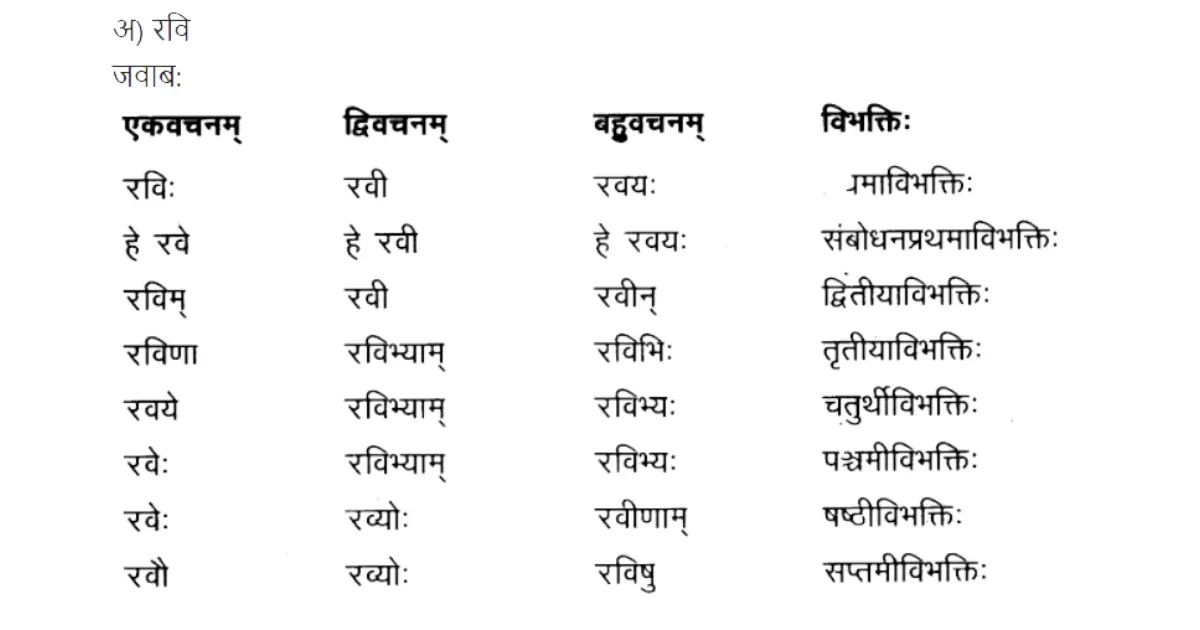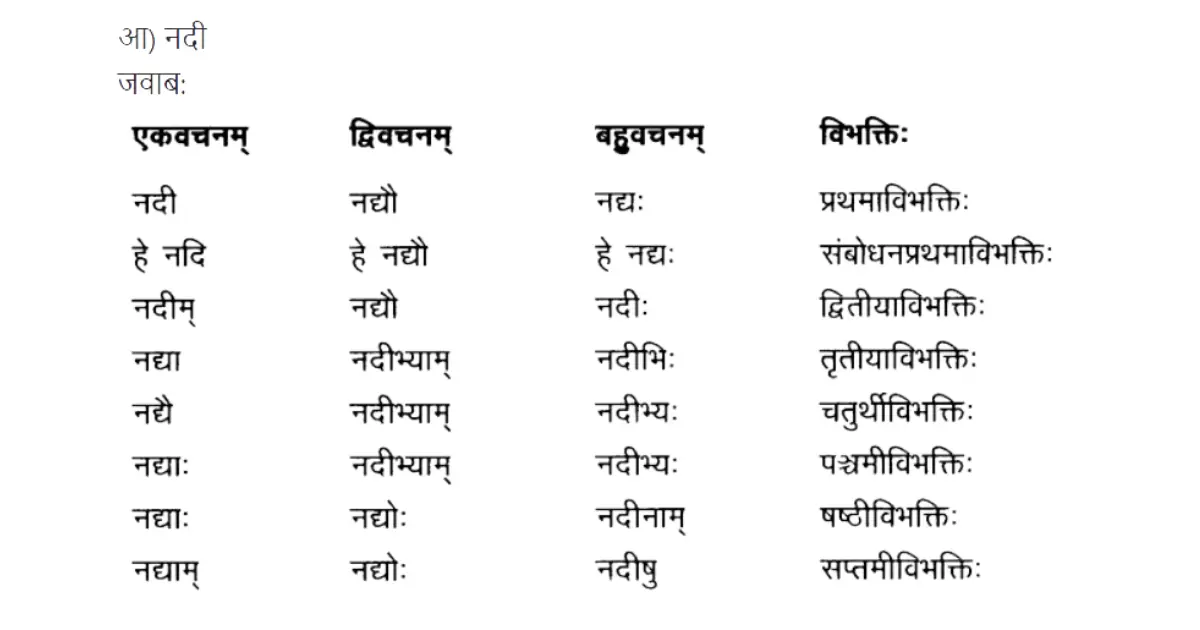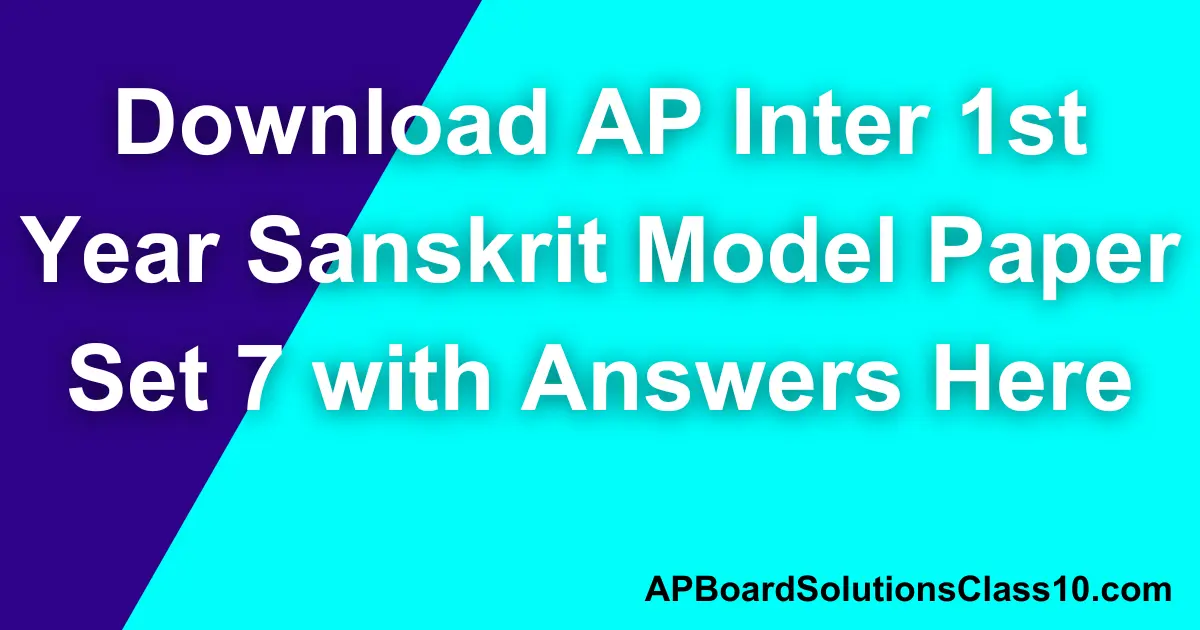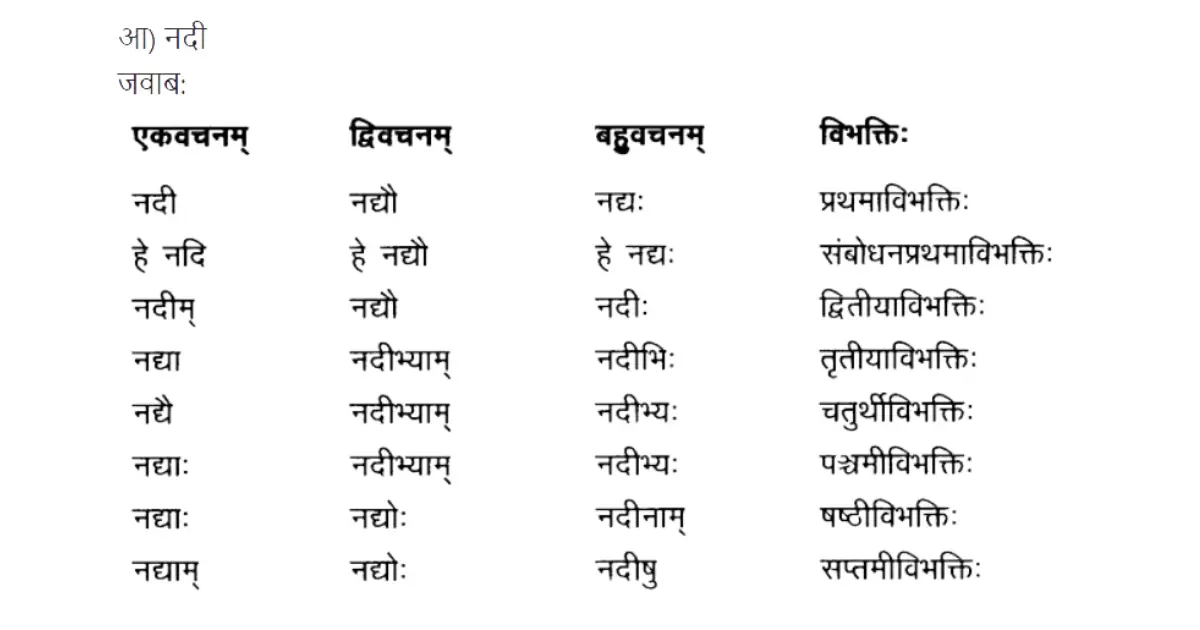You can find the 1st Year Sanskrit Model Paper Set 7 related to AP Inter Board here under Questions and Answers. On the apboardsolutionsclass10.com website, not only Sanskrit but also 1a, 1b, English, physics and chemistry model papers are available to you. Test books and class notes can be found for free on our website.
AP Inter 1st Year Sanskrit Model Paper Set 7 with Solutions
Time: 3 Hours Max Marks: 100
सूचना: प्रथम, द्वितीय, तृतीयप्रश्नान् अनुवादप्रश्नं च विहाय अन्ये प्रश्नाः संस्कृतभाषायामेव समाधातव्याः।
- एकं श्लोकं पूरयित्वा भावं लिखत। (6 × 1 = 6 M)
अ) दुर्जनः परिहर्तव्यो ……………. किमसौ न भयङ्करः॥ ज. दुर्जनः परिहर्तव्यो विद्ययाऽलङ्कतोऽपि सन्। मणिना भूषितः सर्पः किमसौ न भयङ्करः|| A wicked person, even though adorned with education, should be avoided. Is not a serpent terrible even though bedecked with a jewel?
आ) चला लक्ष्मीः ……………. एको हि निश्चलः|| ज. चला लक्ष्मीः, चलाः प्राणाः, चलं जीवितयौवनम्। चलाचले च संसारे धर्म एको हि निश्चयः॥ Wealth is impermanent, life is impermanent, youth is impermanent, and in this impermanent world, dharma alone is permanent.
II. एकं निबन्धप्रश्नं समाधत्त। (6 × 1 = 6 M)
अ) दशरथस्य पश्चात्तापः इति पाठस्य सारांश लिखत।
ज. Introduction: The lesson दशरथस्य पश्चात्तापः is an extract from the Ayodhya Kanda of Ramayana, written by Sage Valmiki. Rama went to the forest at the command of Kaikeyi. Dasaratha could not bear separation from Rama. Then he told Kausalya that he was cursed by a sage during his youth.
Dasaratha’s Lamentation: Dasaratha told Kausalya that one would receive the good or bad fruits of one’s own deeds only. Dasaratha committed a sin during his youth. He was famous for his ability to shoot at sound. He received the fruit of his action just as a boy who had eaten poison out of ignorance.
Going for hunting at night: Once, when it was rainy season, Dasaratha went to the bank of river Sarayu at night for hunting. There, he heard the sound of a pitcher being filled with water. He mistook it for the sound made by an elephant and released an arrow towards that sound. अचक्षुर्विषये घोषं वारणस्येव नर्दतः।
The painful human cry: Then he heard a human voice crying how anyone could hit a hermit, who came to the river to carry water. He grieved for his old parents. It was a cruel stupid, who killed all of them.
Dasaratha found a boy: Dasaratha rushed to the bank of the river to find a hermit hit by his arrow. His hair was scattered, and the water pitcher fell at a distance. The boy asked the king what harm he did to him. He was about to carry water to his parents. Dasaratha killed his parents also who were weak and blind. He asked Dasaratha to carry the news to his father. पितुस्त्वमेव मे गत्वा शीघ्रमाचक्ष्व राघव।
The old and blind couple: Carrying the water pot, Dasaratha went to the hermitage and saw the weak and blind parents of the boy who were without any support, and who looked like birds with clipped wings. The old man thought that it was his son, and asked him to give him some water. Then Dasaratha said that he was not their son, and he was Dasaratha, a Kshatriya. He told them that he went at night to the bank of the river Sarayu to kill any wild animal or an elephant that came to drink water. He mistook the sound of filling a pitcher with water for that of an elephant, and killed it with an arrow. द्विपोऽयमिति मत्वाऽयं बाणेनाभिहतो मया। But he saw their son with the arrow struck in the heart.
The curse uttered by the old man: On hearing those cruel words, the sage could not control his emotion. He cursed Dasaratha saying that he would die lamenting for his son. एवं त्वं पुत्रशोकेन राजन् कालं करिष्यसि।
आ) “अमरवाणीप्रशस्तिः” इत्यस्य पाठ्यभागस्य सारांश लिखत।
ज. Introduction: The lesson अमरवाणीप्रशस्तिः is taken from सुरवाणीमणिहारः written by Sri E. Sathakopacharya. The greatness of Sanskrit, the language of the gods is described in a beautiful way in this lesson.
Salutations to Amaravani:
The poet salutes to Sanskrit, which is affectionately fondled by Brahma and other gods, praised by Valmiki, Vyasa and other poets, and decorated by Kalidasa and other poets.
The poet says that the speech of the gods has descended to the earth showing compassion on humans, who cannot roam in the heaven or enjoy with the celestial damsels. धरणिममरवाणि प्राप्य नाकीकरोषि।
He further says that had not the goddess come down thus, men would have fallen in the well of birth and death. Because they would not have known god.
The greatness of Sanskrit: The poet says that Sanskrit is the mother of all languages. भवसि सकलभाषाजन्मदात्री यत्स्तवम्। Other languages shine by their association with Sanskrit just as moon lotuses bloom because of their association with the moon. This language shines with many meanings in every syllable like the ocean with gems. विराजसे अनल्परन्नाद्याश्रयः सागरो यथा। Even if some people criticize her, it does not diminish her greatness. Bursting meteors do not dry up the ocean.
It the greatness of Sanskrit that even after ages passed, one still remembers Valmiki, Vyasa and Kalidasa.
None equals the goddess of speech: Men may make rockets, travel in space reaching the moon or go to the heaven with human bodies, still they pray for the grace of the mother of speech. She subdues the suffering of birth by teaching brahmavidya, delights with the poems of Kalidasa etc. and leads to the path of prosperity by preaching dharma. There is none equal to her. त्वत्समा कास्ति मान्या।
There may be many languages in the world. But they are of no use. A river which quenches the thirst of the traveller in summer is the best.
The poet asks man that what happens to him if the bombs he is making explode. If one wants to follow the panchasheel of Nehru, then one should resort to Sanskrit that develops the spiritual knowledge.
III. एकं निबन्धप्रश्नं समाधत्त। (6 × 1 = 6 M)
अ) पुण्डरीकमुद्दिश्य कपिञ्जलः किम् उपदिदेश?
Answer:
Introduction: The lesson Kapinjalopadesa is an extract from the Kadambari, written by Bana. Pundarika, an ascetic fell in love with a celestial nymph Mahaswetha, His friend Kapinjala advised him that it was not proper for him to lose his self control. He asked him to condemn the Love-god.
Kapinjala’s questions:
Kapinjala told Pundarika that it was not proper for Pundarika to behave in such a way as the common men would behave. The ascetics had the wealth of courage. धैर्यधना हि साधवः। He asked Pundarika why he did not restrain himself. How he was attacked by the senses. Where had his courage, self-restraint, calmness, celibacy, learning, disinterestedness and distaste for pleasures gone? If people like him were also sullied by passion then there was no use of intellect, study of the scriptures, culture, knowledge received from the teachers, and awakening., निरर्थकः He asked him how did he not notice the crystal rosary that fell from his hand and taken away by that evil woman. He exclaimed that Pundarika was ab- sent minded, and thought of rescuing him before his heart was stolen by that evil woman. अहो विगत चेतनत्वम्।
When Pundarika accepted that he was attracted by the beauty of Mahaswetha, Kapinjala further advised thus.
Kapinjala’s advice:
He asked Pundarika whether it was taught by his teachers of he studied it in the scriptures. Was it a means to acquire Dharma, a new kind of penance, a mystic vow or path leading to heavens? Could he even imagine this, let alone tell or see? Why did he allow the Cupid make him a laughing-stock? Only fools are tor- mented by the Cupid मूढो हि मदनेन आयास्यते Could he have happiness in some- thing condemned by the virtuous and honoured only by the vile?
He said that he was a fool, who watered a garden of poisonous plants, em- braced a sword creeper, held a black serpent or touched a burning coal thinking them to be something else. If he could not restrain his senses or control his mind, what was the use of his knowledge like that of the light of a firefly? And he ad- vised him to condemn the stupid Love-god.
आ) वर्षादेव्याः परिदेवनं संक्षेपेण लिखत।
Answer:
Introduction: The lesson Varshaparidevanam was written by Prlf. G.S.R. Krishna Murthy. He wrote Vanaki, Suvarna svachalitam etc. story books. In Varsha- paridevanam, the author describes how the goddess of rain laments at the envi- ronmental pollution.
The Early morning:
Once the early mornings were filled with the cooing of the cuckoos, chirping of the birds, fragrant breezes etc. Everywhere there was purity. All were pure in body, mind and speech. But time changed. Roads became dusty. Vehicle and factory were emitting smoke. Garbage piled up. Culverts were clogged. People suffered from epidemics. Even the animals and the trees suffered. The goddess of rain was thinking about that. She requested the sun and saw that clouds were formed, and there was rain. She swept the universal yard, and decorated it with the rainbow.
IV. चतुर्णां प्रश्नानां समाधानानि लिखत । (4 × 2 = 8 M)
अ) चाणक्यः कस्य राज्ञः अमात्यः ?
जवाब:
चाणक्यः चन्द्रगुप्तस्य राज्ञः अमात्यः । सः नन्दवंशम् उन्मूल्य चन्द्रगुप्तं सिंहासने अध्यारोपयत् ।
आ) राजसान्नवाच्याः के भवन्ति ?
जवाब:
अतिकषायपदार्थः, अतिलवणम्, अत्युष्णापदार्थः अतिक्षारपदार्थः, अत्याम्लपदार्थः, अतिक्षातिदाहपदठार्थाः राजसान्नवाच्या भवन्ति ।
इ) बोपदेवविरचितः व्याकरणशास्त्रग्रन्थः कः ?
जवाब:
बोपदेवविरचितः व्याकरणशास्त्रग्रन्थः मुग्धबोधः ।
ई) कृपणस्य अग्रे गगनं दृष्ट्वा सर्वे किं कृतवन्तः ?
जवाब:
कृपणस्य अग्रे गमनं दृष्ट्वा सर्वे अट्टहासं कृतवन्तः ।
उ) नागार्जुनः कः ?
जवाब:
नागार्जुनः रसायनशास्त्रज्ञः प्रसिद्धः चिकित्सकः च ।
ऊ) पेटिकायां व्यापारी किम् अपश्यत् ?
जवाब:
पेटिकायां व्यापारी एवं जीर्णं धौतवस्त्रम् एकं प्राचीनं करांशुकम् एकं पुरातनं पादत्राणम् च अपश्यत् ।
V. द्वयोः संदर्भ व्याख्यानं लिखत ।
अ) अचक्षुर्विषये घोषं वारणस्येव नर्दतः ।
जवाब:
परिचयः – एतत् वाक्यं दशरथस्य पश्चात्तापः इति पाठ्यभागात् सवीकृतम् । अयं पाठ्यभागः
वाल्मीकिरामायणे अयोद्याकाण्डतः स्वीकृतः ।
सन्दर्भ: – दशरथः कौसल्यां प्रति मुनिशापवृत्तान्तम् कथयन् एवम् उक्तवान् ।
भावः – अदृष्टिगोचरे रात्रौ गजस्य शब्दः इव श्रुतः ।
विवरणम् – दशरथः कौसल्याम् उक्तवान् यत् सः एकदा रात्रौ मृगयार्थं सरयूतीरं गतवान् । तत्र रात्रौ जलेन पूर्यमाणस्य कुम्भस्य शब्दः गजस्य शब्दः इव श्रुतः ।
आ) न रत्नमन्विष्यति मृग्यते हि तत् ।
जवाब:
परिचयः एतत् वाक्यं मायावटुः इति पाठ्यभागात् स्वीकृतम् । एषः भागः कालिदासस्य कुमारसम्भवे पञ्चमसर्गात् स्वीकृतः ।
सन्दर्भः – मायावटुः पार्वतीम् एवं वदति ।
भावः – रत्नं अन्वेषणं न करोति । तत् अन्विष्यते ।
विवरणम् : पार्वत्याः तपोवनं एकः जटिलः प्रविवेश । सः अवदत् यत् यदि पार्वती पतिमिच्छति तपसा अलम् । रत्नं न अन्विष्यति । तत् अन्वेष्यते ।
इ) भवति सकलभाषाजन्मदात्री यतस्त्वम् ।
जवाब:
परिचयः – एतत् वाक्यं अमरवाणीप्रशस्तिः इति पाठ्यभागात् स्वीकृतम् । अस्य कविः श्रीमान् ई. शठकोपाचार्यः ।
सन्दर्भः – कविः अमरवाणीं प्रशंसन् एवं वदति ।
भावः – त्वम् सकलभाषाणां जननी ।
विवरणम् – जगति सर्वाः भाषाः संस्कृतसंपर्केण विराजन्ते । संस्कृतभाषा सकलभाषाजननी ।
ई) यतः प्रकृष्येत मनुष्यवर्गः ।
जवाब:
परिचयः – एतत् वाक्यं कपीनामुपवासः इति पाठ्यभागात् स्वीकृतम् । अस्य कविः श्रीशैलं ताताचार्यः ।
सन्दर्भः – कपिसार्वभौमः अन्यान् कपीन् एवं वदति ।
भावः – मनुष्याः कथं प्रकर्षम् आप्नुवन्ति ।
विवरणम् – कपिसार्वभौमः वदति यत् कपयः लोकत्रये प्रसिध्दाः बभूवुः । परन्तु केन मनुष्याः प्रकर्षम् वति ।
VI. द्वयो: संदर्भ व्याख्यानं लिखत ।
अ) अहो विगतचेतनत्वम् ।
जवाब:
परिचयः एतत् वाक्यम् ‘कपिञ्जलोपदशः इति पाठ्यभागात् स्वीकृतम् । अस्य मूलग्रन्थः कादम्बरी । अस्य कविः बाणः ।
सन्दर्भः महाश्वेतायाम् अनुरक्तम् पुण्डरीकम् सन्मार्गे प्रवर्तयितुं कपिञ्जलः एवम् उपदिशति ।
अर्थः – अहो, अचेतनत्वम् ।
विवरणम् – कपिञ्जलः पुण्डरीकं वदति यत् पुण्डरीकस्य स्थितिः तस्य अनुरूपा न । सः अचेतनः इवास्ति । करतलात् भ्रष्टाम् अक्षमालाम् अपि न लक्षयति ।
आ) कुम्भकारोऽपि यो विद्वान् स तिष्ठतु पुरे मम ।
जवाब:
परिचयः – एतत् वाक्यं भोजस्य औदार्यम् इति पाठ्यभागात् स्वीकृतम् । अस्य कविः बल्लालः ।
सन्दर्भः – भोजः मुख्यामात्यम् एवम् अवदत् ।
भावः – विद्यावान् चेत् कुम्भकारः अपि मम नगरे निवसतु ।
विवरणम् – कदाचित् भोजः मुख्यामात्यम् एवम् अवदत् – अविद्वान् चेत् ब्राह्मणः अपि नगरात् बहिः गच्छेत् । विद्वान् चेत् कुम्भकारः अपि नगरे वसतु ।
इ) पुण्यरूपाणि एतानि पुष्पाणि वन्दे |
जवाब:
परिचयः – एतत् वाक्यं स्वेदस्य पुष्पाणि इति पाठ् यभागात् स्वीकृतम् । अस्य रचयित्री डा. माधवी जोषी ।
सन्दर्भः – रामः शबरीम् एवं वदति ।
भावः – मातङ्गस्य पुण्यरूपाणि एतानि पुष्पाणि नमस्करोमि ।
विवरणम् – शबरी स्वेदपुष्पाणां कथां रामाय अकथयत् । तत् श्रुत्वा रामः तानि पुष्पाणि नमस्कृतवान् ।
ई) स्वच्छतायै प्रयतामहे ।
जवाब:
परिचयः – एतत् वाक्यम् वर्षापरिदेवनम् इति पाठ्यभागात् स्वीकृतम् । अस्य रचयिता आचार्य गुल्लपल्लि श्रीरामकृष्णमूर्तिः ।
सन्दर्भः – स्वच्छतापरिरक्षणार्थं प्रयत्नं करणीयमिति वदन्ती वर्षादेवी एवं प्रबोधयति ।
भावः – स्वच्छतार्थं प्रयत्नं कुर्मः ।
विवरणम् – विश्वं कलुषितम् इति दुःखित्वा वर्षादेवी स्वच्छतापरिरक्षणार्थं जनान् प्रबोधयति । स्वच्छतार्थं प्रयत्नं कुर्मः । यः क्रियावान् स पण्डितः । इति ।
VII. त्रयाणां प्रश्नानां समाधानानि लिखत ।
अ) मुनिः दशरथं किमिति शशाप ?
जवाब:
मुनिः दशरथं राजन् पुत्रशोकेन त्वं कालं करिष्यसि इति शशाप |
आ) धर्मसाधनेषु आद्यं किम् ?
जवाब:
धर्मसाधनेषु आद्यं शरीरम् ।
इ) पुराकृतानि पुण्यानि मानवान् कथं रक्षन्ति ?
जवाब:
पुराकृतानि पुण्यानि मानवान् वने रणे शत्रुजलाग्निमध्ये, समुद्रे, पर्वते, सुप्तमपि, प्रमत्तमपि, विषमस्थितमपि रक्षन्ति ।
ई) किम् अश्वमेधेन समं विदुः ?
जवाब:
दरिद्राय कृतं दानं, शुन्यलिङ्गपूजनम्, अनाथप्रेतदहनं च अश्वमेधसमं विदुः ।
उ) सकलभाषाजन्मदात्री का ?
जवाब:
सकलभाषा जन्मदात्री अमरवाणी ।
ऊ) कोऽपि कपिः कथं मौनं बिभेद ?
जवाब:
जृम्भां विधाय, हस्तं व्यवधूय, पादं प्रसार्य, गात्रं परिवर्त्य, पुच्छाग्रम् आचुम्ब्य कोऽपि कपिः मौनं बिभेद |
VIII. त्रयाणां प्रश्नानां समाधानानि लिखत ।
अ) कपिञ्जलोपदेशं कस्मात् ग्रन्थात् स्वीकृतम् ?
जवाब:
कपिञ्जलोपदेशः कादम्बरी इति गद्यकाव्यात् स्वीकृतः । अस्य काव्यस्य कर्ता बाणभट्टः ।
आ) धनिनां धनं किम् ?
जवाब:
यत् ददाति यत् अश्नाति तदेव धनिनां धनम् ।
इ) तीक्ष्णदंष्ट्रस्य धर्मोपदेशं श्रुत्वा शशकः किमवदत् ?
जवाब:
तीक्ष्णदंष्ट्रस्य धर्मोपदेशं श्रुत्वा शशकः एवम् अवदत्-एष नदीतीरे तपस्वी धर्मवादी तिष्ठति । तदेनं पृच्छावः ।
ई) बालकाः स्थाने स्थाने कानि दृष्टवन्तः ?
जवाब:
बालकाः स्थाने स्थाने सुन्दराणि पुष्पाणि विकसितानि दृष्टवन्तः ।
उ) व्यासाश्रमद्वारा प्रकटिताः ग्रन्थाः के ?
जवाब:
व्यासाश्रमद्वारा प्रकटिताः ग्रन्थाः योगवासिष्ठम्, शङ्करविजयः, पातञ्जल योगदर्शनम्, विवेकचूडामणिः, अष्टावक्रगीता, बृहदारण्यकोपनिषद्, छान्दोग्योपनिषद् इत्यादयः ।
ऊ) स्वच्छताया विषये सर्वकारः किं करोति ?
जवाब:
स्वच्छताया विषये सर्वकारः बहुयन्नान् करोति । नगरपालिकासु, परिशुद्धकर्मचारिणः नियुक्ताः । आकाशवाणी-दूरदर्शनीद्वारा बहु प्रचारयति ।
IX. विरामग्रहणाय अभ्यर्थनपत्रं लिखत ?
जवाब:
गुन्टूर्
दिनाङ्कः 20-11-2018
सविधे –
प्रधानाध्यापकः / प्रांशुपालः
प्रभुत्व (जूनियर्) उच्चमाध्यमिक कलाशाला,
गुन्टूर्
मान्याः !
विषयः विरामस्य कृते अभ्यर्थनम् ।
मम सोदर्याः विवाहार्थम् अहं श्वः स्वग्रामं गमिष्यामि । अतः कृपया दिनत्रयस्य 21-11-2018 तः 23-11-2018 पर्यन्तं विरामं यच्छन्तु इति सादरप्रणामपूर्वकं विज्ञापयामि । मम अनुपस्थितिसमये पाठ्यमानान् पाठान् मित्रसकाशात् ज्ञात्वा अहं पठिष्यामि ।
सधन्यवादम् ।
भवतां विधेयः छात्रः
नाम: × × × × × × ×
अनुक्रमसंख्या × × × × × × ×
प्रभुत्व जूनियर् कलाशाला,
गुन्टूर् ।
(अथवा)
पुस्तकप्रेषणविषये पत्रं लिखत ?
जवाब:
कडप
दिनाङ्कः 20-01-2018
सविधे –
मान्यसञ्चालकाः,
सरस्वतीविद्याप्रकाशन्,
विजयवाटिकॉ
मान्याः !
भवद्भिः प्रकाशितेषु अधोनिर्दिष्टानि पुस्तकानि मया यथानिर्दिष्टम् अपेक्ष्यन्ते ।
| क्र.सं | पुस्तकनाम | कविः | प्रतय: |
|---|---|---|---|
| 1 | कुमारसम्भवम् | कालिदासः | 5 |
| 2 | श्रीमद्रामायणम् | वाल्मीकिः | 4 |
| 3 | पञ्चतन्त्रम् | विष्णुशर्मा | 6 |
| 4 | भर्तृहरिसुभाषितानि | भर्तृहरिः | 3 |
कृपया एतानि पुस्तकानि वि.पि. पि. द्वारा अधोसूचितं सङ्केतं प्रति प्रेषयन्तु ।
सधन्यवादम् ।
भवदीयः / भवदीया
नाम …………
गृहसंख्या 2-11-18
गान्धीरोड़, कडप ।
X. द्वयोः शब्दयोः सविभक्तिकरूपाणि लिखत । (2 × 6 = 12 M)


XII. त्रीणि सन्धिनामनिर्देशपूर्वकं विघटयत ।
अ) वाणीशः
जवाब:
वाणी + ईश = सवर्णदीर्घ सन्धिः
आ) विक्रमोर्वशीयम्
जवाब:
विक्रम + ओर्वशीयम् = गुण सन्धिः
इ) वसुधैव
जवाब:
वसुधा + एव = वृद्धि सन्धिः
ई) वाण्येका
जवाब:
वाणी + एका = यणादेश सन्धिः
उ) पावकः
जवाब:
पौ + अक: = अयवायाव सन्धिः
ऊ) सोऽपि
जवाब:
सः + अपि = पूर्वरुप सन्धिः
XIII. त्रीणि सन्धिनामनिर्देशपूर्वकं सन्धत्त ।
अ) पितृ + ऋणम्
जवाब:
पितॄणाम् = सवर्णदीर्घ सन्धिः
आ) महा + इन्द्राः
जवाब:
महेन्द्रः = गुण सन्धिः
इ) महा + ऐश्वर्यम्
जवाब:
महैश्वर्यम् = वृद्धि सन्धिः
ई) धातृ + अंश:
जवाब:
धात्रंशः = यणादेश सन्धिः
उ) भानो + ए
जवाब:
भानवे = अयवायाव सन्धिः
ऊ) का + अपि
जवाब:
कार्येऽपि = पूर्वरुप सन्धिः
XIV. आन्ध्रभाषायां वा आङ्ग्लभाषायां वा अनुवदत ।
अ) अहं ग्रामं गच्छामि ।
जवाब:
I go to village.
आ) ते पाठम् अपठन् ।
जवाब:
Where did they go.
इ) यूयं कदा खादिष्यथ ।
जवाब:
When will you eat ?
ई) सः नगरं गमिष्यति ।
जवाब:
He will go to city.
उ) सर्वे गुणाः काश्चनमाश्रयन्ते ।
जवाब:
All the virtues depend on gold.
XV. एकेन पदेन समाधत्त ।
अ) दशरथः कां नदीम् अन्वगात् ?
जवाब:
सरयूनदीम् ।
आ) “मायावटुः” इति पाठ्यभागः कस्मात् स्वीकृत: ?
जवाब:
कुमारसम्भवात् ।
इ) घनस्य तृतीया गतिः का ?
जवाब:
नाशः ।
ई) प्रत्यक्षे स्तुत्याः के ?
जवाब:
गुरवः ।
उ) अनरवाणी सर्वमानवान् शुभमार्गे कैः गमयति ?
जवाब:
धर्मसूत्रैः ।
XVI. एकेन पदेन समाधत्त ।
अ) कपिञ्जलः कः ?
जवाब:
पुण्डरीकस्य मित्रम् |
आ) भोजस्य मुख्यामात्यः कः ?
जवाब:
बुद्धिसागरः ।
इ) तीक्ष्णदंष्ट्रः कः ?
जवाब:
अरण्यमार्जारः ।
ई) तृणवत् कान् न गणयेम ?
जवाब:
श्रामिकान् ।
उ) मार्गाः काभिः कलुषिताः ?
जवाब:
धूलिभिः ।

